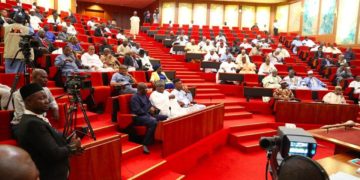The Federal Government has restated its commitment to promoting methanol fuel adoption for a cleaner, more diversified, and sustainable energy future, driven by domestic innovation and empirical data.
This was the focus of a one-day stakeholders workshop on Wednesday, “ Implementation of Selected Zonal Trial of Methanol Fuel Adoption, Promotion and Diffusion,” organised by the Federal Ministry of Innovation, Science and Technology in Abuja. The workshop was part of measures to transition to cleaner energy sources, improve energy efficiency, and promote cleaner transportation options.
In her remarks, the Permanent Secretary of the Ministry of Innovation Science and Technology, Esuabana Nko-Asanye, noted that in the oil and gas sector, the Methanol-Fuel Technology value chain has been identified as having prospects of positively improving all other sectors as listed in the Nationally Determined Contributions (NDCs) and creating jobs for the youth.
Represented by the Ministry‘s Director of Environmental Science and Technology, Ogwuche Bernadette, the Permanent Secretary said the Ministry is playing a key role in promoting this technology, working with other ministries and agencies, primarily to support the national policy on Methanol Fuel Production.
Nigeria’s Nationally Determined Contributions (NDCs) under the Paris Agreement specifically identify energy, oil and gas, transportation, industry and agriculture as priority sectors for climate change mitigation. Nigeria’s Revised NDC submitted in 2021 aims for a 47% reduction in emissions below business as usual(BAU) by 2030, conditional on international support.
According to the Permanent secretary, this project involved deepening the use of methanol fuel in the transport sector to reduce emissions, adding that the outcome of the first phase of the project will sensitise Nigerians on the result of blending different percentages of PMS and methanol on cars, highlights and discuss the implication of the emission data on environmental regulations and recommend strategies for integrating such data and knowledge into the national transport and emission management programmes.
“This process is not just merely technical but also strategic; it ensures that our policies and pilot programmes are inclusive, evidence-based, and well-aligned with the needs and realities of Nigeria’s diverse environmental and socio-economic development. Hence, the ministry is committed to promoting this project through a multi-disciplinary and evidence-based approach.
“The success of the zonal trials will not only inform a potential national roll-out but will also position Nigeria as a leading voice in the development and deployment of Methanol Fuel Production Technology on the African Continent at large,” she added.
The CEO of GasTechno Nigeria Limited, Joe Obueh, who made the keynote presentation, said it has become incumbent on Nigeria to invest more in technology to add value to the Nigerian economy. He lamented the lack of infrastructure, such as methanol plants, which would improve productivity and create jobs for the teeming youth population.










